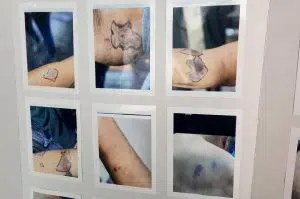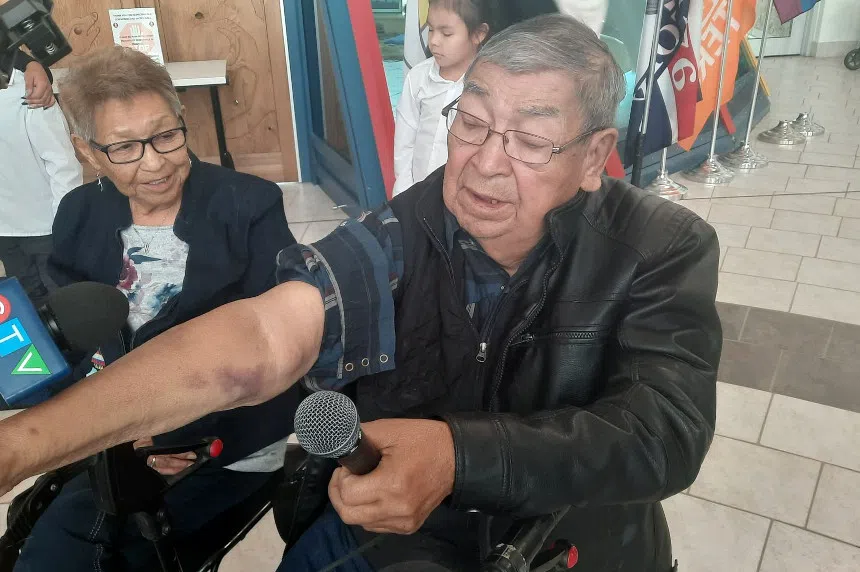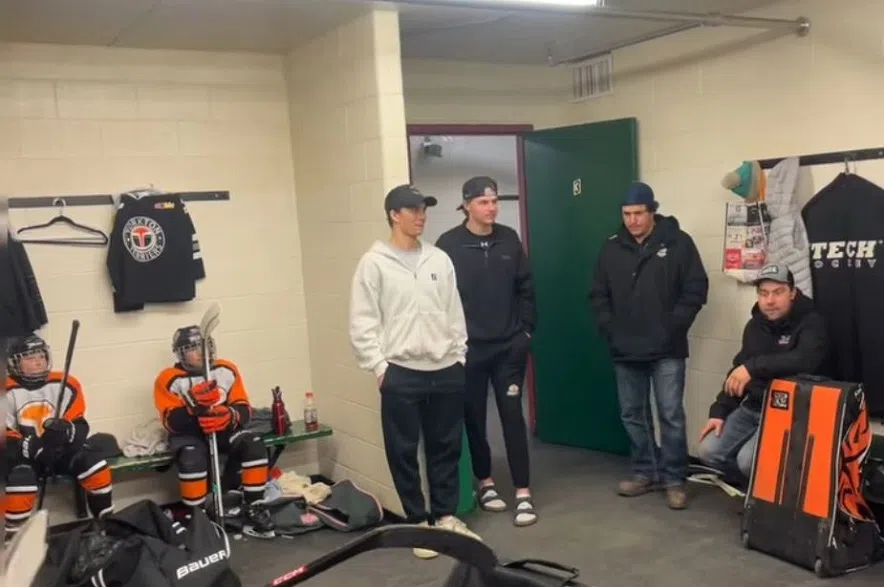Thomas Favel took off his jacket on Tuesday, to show the purple bruises on his arm left from his hospital stay almost two weeks ago.
The 77-year-old’s family said he was admitted to the Regina General Hospital for double pneumonia at the end of September after being sent home from hospitals close to his home on the Kawacatoose First Nation. Ultimately, he had to be airlifted to Regina.
His family was with him in the hospital on Sept. 30, then they went home to rest. That night, Favel said he was awoken by staff manhandling him and strapping him down to the bed.
“(A nurse) pushed me back, and then this guy I didn’t see grabbed me and slammed me onto the bed – that’s where I got bruised up on my back,” explained Favel.
Favel said he asked the staff members why they were doing this, but a worker only said that Favel was trying to run.
“I said, ‘I have no reason to run. I got no reason to run. I don’t know what I’m running away from if I’m running away,’” he said. “They had me stretched on my back and I had my hands tied in front of me.”
Favel, being sick with pneumonia at the time, said he was having trouble dealing with the phlegm he was coughing up.
“I thought I was going to die. I really thought I would smother with my own phlegm.”
Favel said he managed to free himself and called his family the next morning for help.
Annie Ewenin, Favel’s daughter, said she arrived quickly.
“I got there and sure enough, there were restraints on his bed – keeping in mind that he was in hospital for double pneumonia. They restrained him that night and they laid him flat on his bed. When I got there he still had phlegm on his chin from trying to spit it up where he was choking all night,” said Ewenin.

Photos taken by family show some of the bruises Thomas Favel had when he came home from the hospital. Oct. 11, 2022 (Lisa Schick/980 CJME)
While Favel said he’d been told he was trying to run away, Ewenin said a hospital staff member told her her father was restrained because he was delirious, and another said it was because he was trying to walk and was a danger to himself.
Ewenin said she and her family tried to get the names of the nurses who’d been assigned to her father, but hasn’t been able to get them so far.
“To this day I still don’t know the nurses’ names,” Ewenin said. “They haven’t (told) us if the doctor signed off on that order to restrain him.”
The family said they complained to a doctor and, after more waiting, were able to take Favel home. There, they saw the bruises he’d received when he was restrained.
“You can see the pinch marks on his skin where they held him. You can see the bruising on him – his back and his hip. His back still hurts today and his hip still hurts today,” said Ewenin.
She said she’s made a complaint to police, but wants to help ensure nobody goes through the same ordeal. Ewenin said no one should go to a hospital looking for help and come out with new injuries.
“We took him home with his infection and I cared for him, my mother cared for him, my daughters cared for him, my sons. We have no medical background, but he was safer with us than he was in that hospital,” said Ewenin.
Ewenin said she believes her father was treated poorly because he is Indigenous. She said this wasn’t the first time her father and their family have been treated badly at the hospital.
Ewenin explained that Favel’s hospital room wasn’t cleaned, the family had to feed, dress and change him themselves, and they once caught a nurse force-feeding Favel.
“I was livid. I was ready to attack him and my dad called me off. Seeing my dad laying there, crying, with a man on him forcing food down him,” Ewenin said.
The family is also frustrated over changes to their doctors, Ewenin said. They said they liked Favel’s previous specialist, but the doctor’s now no longer able to see him. They haven’t been given any good reasons why not.
Ewenin, who has organized dialysis appointments for several people on the First Nation, said she’s seen similar issues before. She said Indigenous patients are asked to wait outside the renal unit for their appointments, while others walk in and out.
Ewenin said they’ve been making complaints to the Saskatchewan Health Authority – previously the health region – for 14 years, as long as her father has been getting dialysis three times a week, and they don’t get real answers.
“I’m no longer interested in reaching out to them,” said Ewenin.
The family is working with the Federation of Sovereign Indigenous Nations’ Health Ombudsperson’s office. The news conference on Tuesday was arranged by the FSIN.
“This is a human rights case. It’s a racial discrimination case, and it’s a medical malpractice case,” said FSIN Chief Bobby Cameron.
Cameron said what happened to Favel was a disgrace and an embarrassment to the hospital. The chief said he’s planning on getting to the bottom of it.
“Enough is enough. We’re sick and tired of our First Nations people being treated poorly, unjustly, time and time again,” said Cameron.
The chief said Favel and his family want to seek legal action, and that the FSIN will support them the whole way.
In a statement, the Saskatchewan Health Authority (SHA) said it’s sorry to hear the concerns being raised by Favel and his family.
“(We) are working to ensure that conversations with family and their supports, formal safety event processes and appropriate medical investigations are completed,” read the statement.
The health authority cited privacy concerns when declining to comment further on the case, but said it always takes such concerns seriously.
The statement also pointed to the SHA’s First Nations and Métis Health services, which employs cultural support workers and patient navigators to help navigate health care.
The health authority also mentioned that SHA staff follow an ‘Adult Least Mechanical Restraint’ policy, which requires staff to exhaust all other nursing interventions before restraining a patient, and to do so for the shortest amount of time necessary.
The SHA also said it is cooperating with the police investigation.







